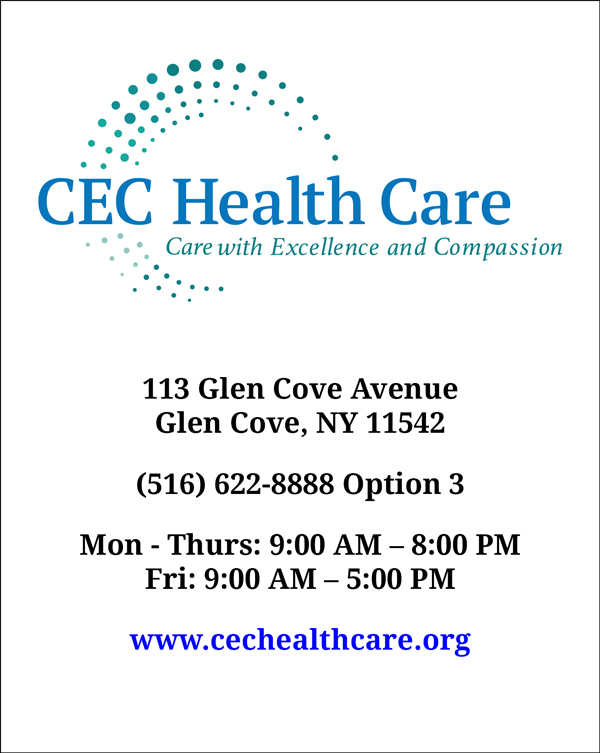CEC Health Care in Glen Cove, NY, offers comprehensive behavioral health services to children through an integrated approach, combining resources from the CEC Article 31 (OMH) Clinic, Certified Community Behavioral Health Clinic (CCBHC), and the Community Mental Health Promotion and Support (COMHPS) program. This integrated model addresses the diverse needs of children and their families, covering mental health, trauma, and social well-being. The site also houses a Federally Qualified Health Center (FQHC), providing primary medical care, making it easier for families to access coordinated, comprehensive healthcare in one location. CEC’s integrated approach enhances the overall patient experience, ensuring seamless, holistic care.

A Community Needs Assessment: Identifying Gaps in Services
In 2023, the CEC CCBHC conducted a Behavioral Health Needs Assessment in the Glen Cove community, revealing a significant gap in youth mental health services, with no current capacity in the area to meet the growing demand for treatment. Interviews with local schools reported being overwhelmed by issues like homelessness, suicidal ideation, and school avoidance. With 1 in 5 children in the U.S. experiencing mental health disorders and 60% lacking care, the need for services like those provided by CEC Health Care is critical (National Alliance on Mental Illness, 2021).
Furthermore, the needs assessment highlighted Glen Cove’s demographic diversity, with 30% of the population being foreign-born, primarily Spanish-speaking. Many of the children had experienced trauma both in their home countries and during their migration to the United States. These children face additional challenges related to mental health, as studies show that immigrants, particularly refugees, have higher rates of post-traumatic stress disorder (PTSD) and anxiety (American Psychological Association, 2019). These findings emphasized the urgent need for mental health services that were not only accessible but also culturally competent.
Expanding Access to Care in January 2024
In response to these pressing needs, CEC Health Care’s OMH Clinic in Glen Cove began providing mental health treatment to children aged 6 and older in January 2024. The clinic’s team was carefully assembled, including bilingual mental health counselors, social workers, creative arts therapists, a child psychiatrist, and psychiatric nurse practitioners, all with prior experience in working with youth. This multidisciplinary team is able to address a wide range of concerns, such as bullying, depression, anxiety, school avoidance, and trauma. The importance of a multidisciplinary approach to childhood mental health care has been supported by research, which shows that integrating various treatment modalities is essential for addressing the complex needs of children facing mental health challenges (National Institute of Mental Health, 2020).
About 15% of the clinical work, particularly with parents, is conducted in Spanish, ensuring that language barriers are not an impediment to treatment. This approach has been instrumental in providing accessible services to families in need, particularly in a community with a high percentage of Spanish-speaking residents. Research has shown that cultural and language competence in mental health services significantly improves engagement and outcomes for immigrant populations (Chavez et al., 2016).
Family Support: The Role of the Family Peer Advocate
In addition to clinical services, CEC Health Care recognizes the importance of supporting the families of children receiving mental health care. The CCBHC program includes the services of Family Peer Advocates, individuals who have personal experience as caretakers for someone with a mental health or substance use diagnosis. These advocates help parents navigate the complexities of behavioral health treatment, understand the therapeutic process, and prioritize their own well-being alongside that of their children.
The Family Peer Advocate is an additional layer of support that has been invaluable in helping parents feel more empowered and informed as they engage with the mental health system. The importance of family involvement in mental health treatment has been demonstrated in numerous studies, with research showing that parent engagement can significantly improve treatment adherence and outcomes for children (U.S. Department of Health & Human Services, 2021).
Community Outreach and Immigrant Support
The CCBHC’s COMHPS team provides mental health outreach and wellness services throughout the Glen Cove community and neighboring school districts. One of the team’s primary focuses has been providing special presentations to immigrant youth. A COMHPS staff member, who himself is an immigrant, shares his personal experiences with the children, helping them process their feelings about coming to a new country and the challenges they face. Research on trauma-informed care emphasizes the importance of using peer-led support, particularly for immigrants, as it fosters trust and helps children relate to the material being shared (Lester et al., 2016). Children who participate in these presentations may later be referred to CEC Health Care or other providers for more formal treatment, ensuring that they receive the appropriate care based on their needs.
Additionally, the COMHPS Team recently began scheduling “Art Expressions” at the Nassau County Juvenile Detention Center as a way to allow those youth to express their feelings in a safe environment.
Creative Arts Therapy: Empowering Youth to Express Emotions
In addition, creative arts are utilized in individual therapy sessions, allowing children to express their emotions and build aspirations for the future. These sessions provide an opportunity for youth to explore their trauma in a safe and creative environment. Creative arts therapies are particularly effective for children in processing trauma and expressing emotions in a non-verbal way (Pipher, 2002).
Integrated Care and Positive Outcomes
CEC Health Care’s collaborative approach to care—spanning multiple programs—has resulted in high satisfaction among both parents and children. Through regular communication and coordination between the OMH Clinic, CCBHC, and COMHPS teams, CEC has been able to provide effective, coordinated care that addresses the broad spectrum of issues children face. This integrated approach has led to positive outcomes for many families in the Glen Cove community, demonstrating the power of a multi-faceted, holistic model of care. A study published in the Journal of Child and Family Studies highlighted the positive impact of integrated behavioral health services on improving outcomes for children, particularly when multiple service providers collaborate (Cohen et al., 2018).
Erin Barrett, LCAT, is Assistant Director of Children and Adolescent Services at CEC Health Care.
Citations
American Psychological Association. (2019). Mental Health and Immigrants: An Overview. Retrieved from https://www.apa.org
Chavez, L., et al. (2016). Culturally competent mental health care for immigrant populations. Journal of Immigrant & Refugee Studies, 14(2), 162-177.
Cohen, J., et al. (2018). Integrated Behavioral Health and Child Outcomes: A Collaborative Approach. Journal of Child and Family Studies, 27(5), 1298-1309.
Lester, P., et al. (2016). Peer-Led Support for Immigrant and Refugee Children. International Journal of Refugee Law, 28(4), 341-357.
National Alliance on Mental Illness. (2021). Mental Health in Children and Adolescents. Retrieved from https://www.nami.org
National Institute of Mental Health. (2020). Mental Health and Children. Retrieved from https://www.nimh.nih.gov
Pipher, M. (2002). The Role of Creative Arts in Trauma Recovery for Children. Journal of Child & Adolescent Trauma, 6(3), 202-220.
U.S. Department of Health & Human Services. (2021). Parent and Family Engagement in Child Mental Health Care. Retrieved from https://www.hhs.gov







